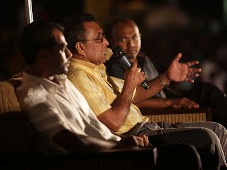The government of the Maldives can no longer be “hijacked” by taking over the army headquarters and arresting or assassinating the incumbent ruler as in centuries past, deposed President Mohamed Nasheed said on Sunday night.
Addressing supporters on the third night of the ongoing Maldivian Democratic Party (MDP) ‘Journey to Justice’ protest, Nasheed explained that “the days when this country was ruled by the might of the forearm has been relegated to the past.”
“What we are seeing today is that the Maldivian people will not idly sit by and watch the flame of freedom flicker out,” he said.
He added that taking control of the army headquarters to assume executive power was “an outdated and antiquated way of thinking” in the 21st century.
“The secret or essence behind this is that the government of this country is not the property of the ruler,” he continued. “The government of this country belongs to its people. It can only be stolen from the people after arresting all of them or when there are no longer any people left in this country.”
A Maldivian government could no longer rule over the populace without their consent and respect, he added.
“The days when the Maldivian people could be beaten into submission with electric batons, pepper spray or sticks are long past,” he asserted, adding that “most Maldivians value freedom and despise brutality.”
Nasheed expressed concern with the continued arrest and detention of elected councillors and MDP supporters across the country.
In contrast to fiery speeches by MDP MPs threatening to march the crowd to “reclaim what was stolen,” Nasheed insisted that violent confrontations or the use of force would not be necessary.
He went on to congratulate the protesters for “showing an example to the world” of a peaceful demonstration.
“Shedding a single drop of blood from any Maldivian” would be unacceptable, he added, advising protesters to act “with wisdom and patience.”
Nasheed also urged speakers who take the stage to not abuse the right to free expression by using indecent or “obscene language” or resorting to personal attacks.
Day four
 On the following night, former TV presenter Miqdad Adam hosted a panel discussion with former ministers Hassan Latheef and Hassan Afeef along with lawyer Ahmed Abdulla Afeef focusing on the legal issues surrounding the transfer of power.
On the following night, former TV presenter Miqdad Adam hosted a panel discussion with former ministers Hassan Latheef and Hassan Afeef along with lawyer Ahmed Abdulla Afeef focusing on the legal issues surrounding the transfer of power.
Hassan Afeef, former home minister, explained that the coup started with “rebelling or mutinying officers” refusing to obey orders from the former Commissioner of Police and his deputies on the night of February 6.
Shortly before beginning their protest at the Republic Square in the early hours of February 7, a rogue group of riot police attacked the MDP Haruge (headquarters), assaulted former State Minister for Home Affairs, Mohamed ‘Monaza’ Naeem and ransacked the place.
According to eyewitnesses, a police officer hit an elderly man on the head with a chair. Haruge was attacked for a second time after a group of soldiers and police assisted by gang members took over the state broadcaster.
Afeef added that a number of army officers also refused to obey orders from either the Commander-in-Chief or Chief of Defence Forces Brigadier General Moosa Ali Jaleel.
If police officers believed they were given an unlawful order, Afeef continued, they should complain through the proper channels.
Afeef noted that current Police Commissioner Abdulla Riyaz, Defence Minister Mohamed Nazim and State Minister for Home Affairs Mohamed Fayaz ‘FA’ had “no legal status” to enter army barracks, negotiate on behalf of the mutinying police or relay demands to President Nasheed.
Local media reported on the morning of February 7, between 10am and 11am, ex-Colonel Nazim addressing the crowd and informing them that President Nasheed had been told to “immediately and unconditionally resign” before 1.30pm.
Afeef claimed that Nazim told President Nasheed that “his life could be in danger” if he refused to comply with demands from mutinying police and army officers.
Former Youth Minister Hassan Latheef referred to opposition politicians meeting then-Vice President Dr Mohamed Waheed at 1:00am at his official residence following a night of roving protests. He added that Dr Waheed evaded questions from cabinet members the next day.
Lawyer Ahmed Abdulla Afeef meanwhile criticised Chief Justice Ahmed Faiz for administering the oath of office on February 7 without looking into whether President Nasheed resigned under duress or not.
Ahmed also noted that the resignation letter was snatched by “the three men with no legal status” who entered the President’s Office with a number of army officers and took the letter to parliament.
Calling for an independent inquiry, Ahmed argued that compromising President Nasheed’s volition or discretion at any point of the process would render the resignation unlawful.
The former ministers also contended that opposition parties resorted to a violent takeover because they were convinced MDP would have won the 2013 presidential election based on delivery of campaign pledges, such as free universal healthcare, housing programmes and a nationwide transport network.
Likes (0)Dislikes
(0)Dislikes (0)
(0) 